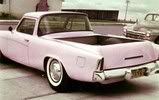Having been brought up with Ford flathead engines, I know that the filters only serviced 60% of the oil. Are the Stude filters any better? The reason I want to know is that my filter leaks around the top and I have to put silicone sealer on it. I'm considering a remote filter set up, but if the filter does a good job cleaning I might just buy a new one. Thanks.
Joe
Joe




 Joe: Are you saying you have a replaceable-cartridge "can-type" filter on top of your engine and the lid is leaking? If so, please don't try to seal it with silicone. It takes a lot of pressure when cold and might burst when you least expect it, creating one helluva mess.
Joe: Are you saying you have a replaceable-cartridge "can-type" filter on top of your engine and the lid is leaking? If so, please don't try to seal it with silicone. It takes a lot of pressure when cold and might burst when you least expect it, creating one helluva mess. BP
BP
 We've got to quit saying,
We've got to quit saying, 

Comment